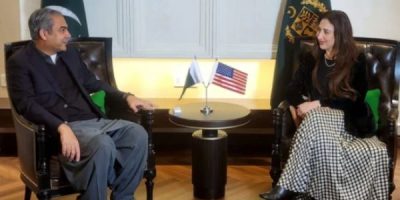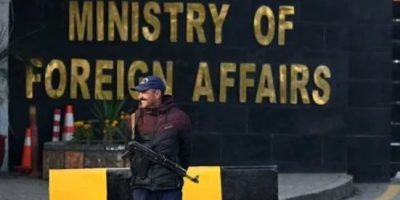OIP discusses Indonesia’s resilient recovery from multidimensional economic crises

DNA
Islamabad: Session III of the Online Internship Program (OIP) organized by the Indonesian Embassy and Bahria University, discussed Indonesia’s economic successes in reversing the upheavals and its rise as an emerging global economy.
Dr. Muhammad Faisal, Executive Director of Center of Reform on Economics (CORE) Indonesia in his lecture while outlining the main features of the Indonesian economy mentioned that Indonesia is a top 15 global economy, part of the G-20 group and is expected to be one of the top 10 by 2050. He highlighted that Indonesia is a major producer of palm oil, natural rubber, oil & gas, coal and minerals but has also developed a manufacturing and processing industry, with its main industries ranging from labor-intensive to hi-tech. “Indonesia’s as a Middle power is considered an economic giant at ASEAN level, with a GDP over one trillion USD and has successfully reduced poverty rates since 1998” he added.
Dr. Muhammad Faisal, highlighted Indonesia is classified as an upper middle income economy and has reduced its poverty rate since 1998. However, he reminded that these all achievement were made possible only after the country through its resilience recovered from the several political economic crises. “The 1960 domestic severe political and economic crisis which led to hyperinflation, extreme poverty and currency redenomination. The repercussions were political turmoil that eventually led to regime change in the country”, Dr Faisal recalled.
According to the speaker, President Soeharto government from 1966-1996 brought decades of stability and high economic growth to Indonesia, attracting foreign direct investment (FDI) in natural resources extraction and manufacturing sectors. Yet, he said, the 1997-1998 economic crisis hard hit Indonesia and led to high inflation again and a crisis that engulfed countries in Asia. “1997-1998 economic crisis again led to political turmoil and regime change, with an IMF intervention of USD 110 billion” Dr. Faisal explained.
The speaker further highlighted that the Reform Era that follow was marked by political reforms and stronger corruption eradication measures. He stated that during this period, the GDP grew at a lower rate until 2007 but sound economic policies reduced vulnerabilities and strengthened external balances leading to increased forex reserves, FDI, tourism and exports. “The IMF loan was fully repaid, and the Indonesian economy demonstrated resilience during the 2008-2009 global financial crisis” he added.
He further elaborated that, since coming into power in 2014, President Joko Widodo has prioritized infrastructure development and connectivity of the Archipelago. To this end, he said, President Joko Widodo is massively spending on infrastructure development such as airports, toll roads, high-speed train network, seaports, tourism infrastructure and development of the new capital of Indonesia in East Kalimantan.
The speaker made special reference to development strategies pursued under the leadership of President Joko Widodo aimed at promoting downstream industry development, banning raw material exports and encouraging value-added products like EV nonrenewable energy sectors. He also acquainted the participants about Indonesia’s rapid growth of the digital economy and country’s four global unicorn with worth above one billion USD.
In the Q&A session regarding IMF role and intervention, the speaker replied that in 1998 IMF intervention helped but forced liberalization flooded resulted in Chinese products flooding Indonesian market. On the other hand, he said, the forced political reforms which followed massive decentralization still face policy issues. To another question regarding Indonesian strategy to maintain a balance when it comes to relations with US and China, the speaker said that Indonesia’s strategy to maintain balance with the US and China is based on an independent and active foreign policy. “Economic relations ultimately influence political relations but as a natural leader in ASEAN Indonesia must maintain neutrality and centrality of ASEAN”, he concluded.
Session IV of OIP next week will be focusing another dimension of Indonesia’s winding road to build strong and resilient economy.
Related News

Pakistan, US vow to bolster security, border management cooperation
ISLAMABAD, JAN 17: Pakistan and the United States on Saturday agreed to further strengthen cooperationRead More

‘Blatant intrusion’: Pakistan assails India over ‘mosques profiling’ in IIOJK
ISLAMABAD, JAN 17: Pakistan on Saturday condemned India over the profiling of mosques and managementRead More


Comments are Closed